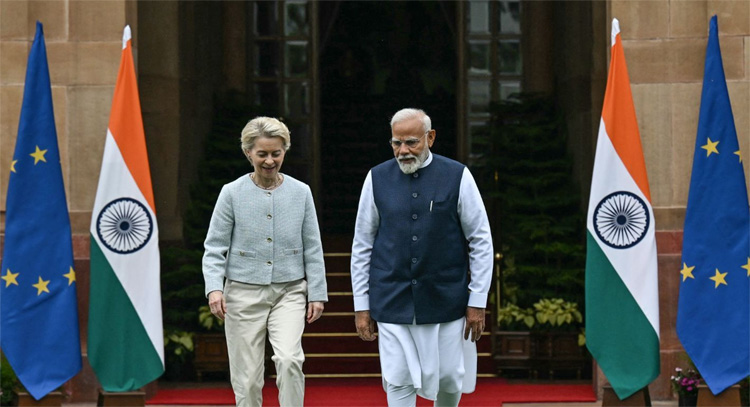US tariffs strengthen rationale for India-European Union FTA: EU ambassador
India and the European Union (EU) have made “good progress” on some aspects of the negotiations for a free trade agreement (FTA) that both sides want to conclude by the year-end, with US threats of tariffs strengthening the rationale for the deal, EU ambassador Hervé Delphin said.
During a visit to India in February with almost the entire EU College of Commissioners, European Commission President Ursula von der Leyen and Prime Minister Narendra Modi threw their weight behind the ambitious goal of finalising the FTA by the end of 2025. The negotiations for the trade deal that began in 2007 were suspended in 2013, and then revived in 2022.
“India and the EU have made good progress in the recent round [of talks in Brussels in March] on some aspects,” Delphin told a small group of journalists on Tuesday, referring to the 10th round of negotiations and also the first held since Von der Leyen’s visit.
“The global environment is accelerating negotiations. The reciprocal tariffs by the US strengthen the rationale for an India-EU FTA, but it will not define them,” he said, pointing to US President Donald Trump’s threat to impose reciprocal tariffs on trade partners around the world from April 2.
Delphin referred to Von der Leyen’s comments last month on US tariffs and said: “We regret the imposition of tariffs. It is bad for trade, for business, and for people. We will defend our interests accordingly.”
He listed several factors for the outcome of the latest round of negotiations, including a high level of political engagement between India and the EU and a “strong determination to get an FTA done”.
“We would like to see the fruits of the harvest by the end of the year and the next India-EU Summit. This is what both leaders expressed during the recent visit of the [EU College of Commissioners]. The political level is fully engaged with regular contacts at the ministerial level,” he said.
The EU envoy said discussions are continuing on “elements of a meaningful trade package” that will be of mutual benefit, and both sides are “working on addressing key asks and respective sensitivities”.
Delphin didn’t give details of these asks and sensitivities, but reports have pointed to India’s call for greater mobility of professionals and its efforts to protect sensitive domestic sectors such as agriculture and dairy while providing market access. At the same time, the EU has sought the slashing of tariffs on alcohol and automobiles.
The Indian side also has concerns about the EU’s Carbon Border Adjustment Mechanism (CBAM) or a tariff on carbon-intensive products such as steel and cement that will take effect in 2026. The Indian side flagged these concerns during Von der Leyen’s visit, describing CBAM as a worry for a large number of countries in the Global South.
The EU is India’s largest trading partner in goods. Two-way trade in goods nearly doubled in the past decade to reach a figure of $135 billion in 2024, while trade in services was worth around $53 billion.
Delphin noted that the EU’s trade deals are fully compliant with the World Trade Organization (WTO).
“They are positive and respected in the long-term,” he said. “EU companies in general are keen to make investments in India. Addressing technical barriers would be an important incentive for them to step up the level of investment, and an FTA would be an accelerator for that.”
Delphin said the EU is looking to significantly scale up cooperation with India in clean tech, semiconductors, and defence and security.
An EU report on the 10th round of negotiations said sectoral sessions were held for the first time since July 2022, looking at specific industries such as automobiles and medical devices and obstacles, such as tariffs and rules of origin, that can impede market access.
In the context of trade in goods, both sides provided “more transparency” on potential improvements to their first offers made in August 2023, the report said. Though there were “intense discussions” on rules of origin for sectors such as agricultural, pharmaceutical and chemical products, fisheries and car parts, the two sides didn’t make “any major breakthrough”.
The report said both sides “agreed to intensify their efforts to progress the negotiations”, and the next round will be held in New Delhi from May 5.


Comments are closed.